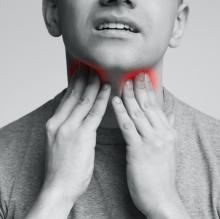Hypothyroidism: Not Just a Women’s Issue

This article was originally published on the blog of Frank Lipman, MD (2018) and has received some major updates.
Hypothyroidism and Hashimoto’s (autoimmune hypothyroidism) are often thought of as a women’s health issue, but we cannot neglect the fact that many males also suffer from this life-altering condition. In fact, Hashimoto’s is on the rise for men and has been for a number of years.
Male or female, Hashimoto’s can have several contributing factors, including intestinal permeability, ongoing stress (physical, mental, emotional, chemical), environmental toxin exposure (the chemical stress just referred to), and a possible infection, such as Epstein-Barr, H. pylori, or yeast/candida.
And it can cause several symptoms for both sexes, including weight gain, cold intolerance, and constipation.
Common symptoms for men include:
- Low testosterone (See more below about the testosterone/thyroid relationship.)
- Low libido
- Depression (This great article mostly references women’s health, but much of it can certainly apply to men.)
- Irritability
- Decreased drive/ambition
- Slowed metabolism
- Elevated cholesterol
- Slowed cognition
- Decreased muscle mass
- Muscle pain and joint stiffness
- Dry skin
- Constipation
- Hair loss (While “male pattern baldness” isn’t uncommon, slow-growing facial hair and loss of outer third of the eyebrows is a tip-off to a thyroid condition.)
Don’t Guess, Test
Given that thyroid issues are so frequently overlooked in women, it can be even more challenging to get a provider to test their male patients’ thyroid values. We often need to act as our own best advocate and ask specifically for a functional thyroid panel. Go here to get the full panel, with an explanation of each value.
Let’s Talk Testosterone
The testosterone/thyroid relationship is of specific concern to men, given that they make so much more of this hormone than women.
And many of the symptoms of low testosterone (“low T”) mimic those of low thyroid function: decreased muscle mass, depression (including low self esteem), low libido, anxiety and being overwhelmed with life, weight gain, hair loss, and irritability, to name a few.
For some, it’s a chicken/egg scenario, because low T can be a contributor to low thyroid function and vice versa. As such, right-sizing thyroid hormones (sometimes thyroid hormone replacement is warranted) can help to raise testosterone and prescription testosterone shouldn’t be ruled out.
In my health coaching practice, I’ve worked with several men with alopecia (we’re talking patchy loss, not male pattern baldness) and in the majority of cases, when we review their DUTCH panel (dried urine testing for comprehensive hormones), their testosterone is way too low. Many of my male clients have said that getting their T up was one of the single best interventions for overall health and wellbeing and…getting their hair back.
[Contact us if you’d like to do a DUTCH panel. It’s the single best hormone test on the market for both men and women. It doesn’t include thyroid, as testing thyroid hormones isn’t (yet?) available with urine metabolites. If you need a functional thyroid panel, I can get you one at a great price through our labs portal.]
Highlight: Zinc
Not only does zinc help to support thyroid health significantly, as outlined in detail in my Essential Thyroid Cookbook, but it also helps to modulate testosterone levels in men. Zinc deficiency is closely associated with low testosterone and low libido.
Other Interventions
- Get plenty of minerals from your diet or targeted supplementation. Including zinc, other common deficiencies associated with Hashimoto’s are magnesium, iodine, and selenium, although all minerals (with the exception of fluoride—steer clear!) are important for both thyroid health and hair growth. (Note: There’s conflicting information on the association between prostate health and selenium. Speak with your doctor before supplementing, especially if you’re at risk for prostate cancer.)
- Make sure that your ferritin (iron storage protein), B12, and Vitamin D levels are adequate. (With the majority of men I’ve worked with, their ferritin has been in the tank, which usually means low iron, which often means low hydrochloric acid and a significantly higher chance of an H. pylori infection. Read more about this trifecta here. This article is about alopecia, but this topic is important for everyone.)
- Talk with your doctor about testing for infections. In my practice, we start with a fecal panel to look for gut pathogens and then, if necessary and with medical guidance, look further under the hood for things like Lyme, etc.
- Sleuth out food sensitivities, as 70-80 percent of our immune system resides in the gut. Many see a significant decrease in thyroid antibodies—and alleviation of symptoms—simply by doing an Elimination/Provocation experiment. (This experiment is also outlined starting on page 116 of our Essential Thyroid Cookbook.)
- Remove as many toxins from your environment as possible, including eating organic as often as you can, filtering water, using clean and green body care products, steering clear of plastics, and using safe cleaning supplies in your home. Gentle liver support is critical for moving toxins O.U.T.
Again, many men—and their healthcare providers—often overlook the role of thyroid health in living a vital, energetic life full of drive and strength. While taking supplemental testosterone often helps significantly, if the thyroid is sputtering in the background, many men end up with a higher than necessary dose of T—or an increased dose over time. And often, symptom abatement isn’t quite what was expected, as supplemental T isn’t a fire extinguisher.
When you address both the thyroid and a possible “low T” situation simultaneously, many men get their strength, vitality, and zest for life back in a pretty short period of time.
Add comment